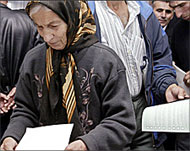Kadyrov set for landslide victory
The Kremlin-backed candidate in Chechnya’s discredited presidential election Ahmad Kadyrov has won more than 82% of votes cast in Sunday’s poll with more than half the votes counted.

The head of the electoral commission Abd al-Karim Arsakhanov said Kadyrov had secured 82.5% of the vote. About 52.85% of the ballots had been counted.
Of the six other candidates, none of whom presented a serious threat to Kadyrov’s election, only Abd Allah Bugayev, with a provisional score of 5.4%, made any impact.
The electoral chief, however, could not declare Kadyrov president until final official results were obtained. Kadyrov has been the leader of Chechnya’s pro-Russian administration since June 2000.
Turnout was set at more than 81%, a figure that appeared barely plausible to journalists at the scene who had visited several polling stations where the number of voters had seemed extremely low.
Russian media divided
Russian media were divided in their assessment of the poll, some critical and others welcoming the election of a new Chechen authority.
Nezavisimaya Gazeta and the business daily Kommersant both stressed the lack of genuine opposition to Kadyrov, while the liberal Gazeta pointed to the resemblance to Soviet-era elections “with their turnouts of 99.998 percent.”
But Izvestia said that “even if the new authority is imperfect, it will still be legitimate.”
Critics, however, have warned that the poll, widely seen as skewed in favour of Kadyrov, would do little or nothing to bring an end to the fighting.
 |
|
Voters had little choice in |
Chechnya’s estimated 560,000 registered voters had a choice of seven candidates, but two of Kadyrov’s main rivals withdrew during the campaign and a third, Malik Saidullayev, a wealthy businessman and former prime minister, was disqualified because of alleged irregularities.
Critics have also contested the poll’s legitimacy on the grounds that it took place in the midst of a war.
The election, which took place amid a high security presence, came almost exactly four years after 80,000 Russian troops poured into the Caucasus republic in what Moscow called an “anti-terror operation” to crush a separatist insurgency.
The conflict has since turned into a brutal guerrilla war of attrition, claiming tens of thousands of civilian lives. Many more have been made refugees trying to flee the fighting.
The pan-European rights body OSCE refused to send observers to the poll, and the rapporteur for Chechnya of the Council of Europe’s Parliamentary Assembly, Andreas Gross, said he could not send observers to what was “not a real election.”
The Organisation of the Islamic Conference (OIC) and the Arab League were the only international organisations to send observers to the election.